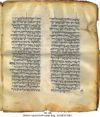Esau
 From Conservapedia
From Conservapedia 
Esau (Hebrew: עֵשָׂו, Ēśāw, "hirsute") or Edom (Hebrew אֱדוֹם, ʾĔḏôm, "red") (b. 2168 AM, or 1836 BC) was the oldest son of Isaac and Rebekah and the older brother of Jacob. He is also the ancestor of the Edomite people, who would strive with the house of Israel for generations to come.
Contents
Prenatal strife[edit]
Even before they were born, Esau and Jacob fought with one another. (Genesis 25:22-26 ) In fact they fought so hard that their mother Rebekah asked herself how she could even survive the combat. So she prayed to God herself about it, and God gave His answer:Two nations are in thy womb, and two manner of people shall be separated from thy bowels; and the one people shall be stronger than the other people, and the elder shall serve the younger. Genesis 25:23 (KJV)
Esau was born first, but Jacob, when he emerged from Rebekah's womb, was grasping Esau's heel. Esau grew to be a skillful hunter of deer and other game.[1][2]
Esau and Jacob probably were fraternal twins, because Esau was extremely hirsute, while Jacob had relatively little body hair.[3]
The birthright sale[edit]
Early in their lives, Esau and Jacob were working in a field. Esau felt very weak, and begged Jacob to give him some red lentil stew that he had prepared. Jacob demanded that Esau sell him his birthright. Esau thought that the birthright would do him little good if he starved that day, so he consented to the sale.[1][2][3] (Genesis 25:29-34 )
Marriages[edit]
When Esau was forty years old (2208 AM or 1796 BC), he married two Hittite women named Judith and Bashemath. Thirty-seven years later (2245 AM or 1759 BC) he would marry a third time, to Mahalath, daughter of Ishmael.[1][2][3]
Loss of blessing[edit]
When the two brothers were seventy-seven years old, Isaac prepared to deliver the blessing to his favored son. Isaac favored Esau, because Esau prepared good-tasting venison for Isaac to eat. Nevertheless, when Esau presented himself to Isaac for his blessing, he discovered that Jacob had already seen Isaac, pretending to be Esau, and had received the blessing instead. Isaac was blind by that time, so Jacob had impersonated his brother by dressing in goatskin, so that his skin would resemble his hairy brother's when his father touched him.
Isaac did have a blessing for Esau: that though Esau would "serve" Jacob at first, eventually he would break Jacob's yoke from his neck. This refers to the later subjugation of the Edomites by the Kingdom of Judah, and the later revolt by the Edomites against that kingdom.
Esau harbored a deadly hate against his brother for years and swore to kill him. But before he could make such an attempt, Jacob fled.[1][2][3] (Genesis 27 )
Reconciliation[edit]
Twenty years later (2265 AM or 1739 BC), Esau would meet Jacob again, when Jacob departed from Padan-aram after a long period of service to Laban. By then Esau had great wealth and an army of 400 men. Nevertheless, the two were reconciled, and the rivalry between them was quiet as long as they both lived. Esau took his household and withdrew to Mount Seir, where the Edomites settled for generations afterward. When in 2288 AM Isaac died, the two brothers buried him in the Cave of Machpelah.[1][2]
Future history[edit]
Unhappily, after the Exodus of Israel, the old rivalry began again. The Edomites refused passage to the Israelites on their way back to Canaan. The stories of the Kings of Israel and Judah speak repeatedly of wars between the Edomites and the Israelites.
More recently, Herod the Great, the infamous king responsible for the Slaughter of the Innocents, was an Edomite (called Idumaean in his day).
The prophet Obadiah made a special prophecy against the Edomites, accusing them of gloating at the conquest of the Southern Kingdom by Nebuchadnezzar II.
The most remarkable achievement attributed to the Edomites, or to any people descended from them, is the Nabataean capital city of Petra, a city carved entirely out of a mountain chain in southern Jordan to the east of the Negev Desert.
References[edit]
- ↑ 1.0 1.1 1.2 1.3 1.4 Konig, George. "Esau." AboutBibleProphecy, n.d. Accessed November 8, 2008.
- ↑ 2.0 2.1 2.2 2.3 2.4 Duffy, Daniel. "Esau." The Catholic Encyclopedia. Vol. 5. New York: Robert Appleton Company, 1909. Accessed November 8, 2008.
- ↑ 3.0 3.1 3.2 3.3 Blank, Wayne. "Esau." Church of God Bible Study, n.d. Accessed November 8, 2008.
See also[edit]
| |||||||||||||||||||
Categories: [Book of Genesis Persons]
↧ Download as ZWI file | Last modified: 02/25/2023 14:42:20 | 103 views
☰ Source: https://www.conservapedia.com/Esau | License: CC BY-SA 3.0
 ZWI signed:
ZWI signed:
 KSF
KSF